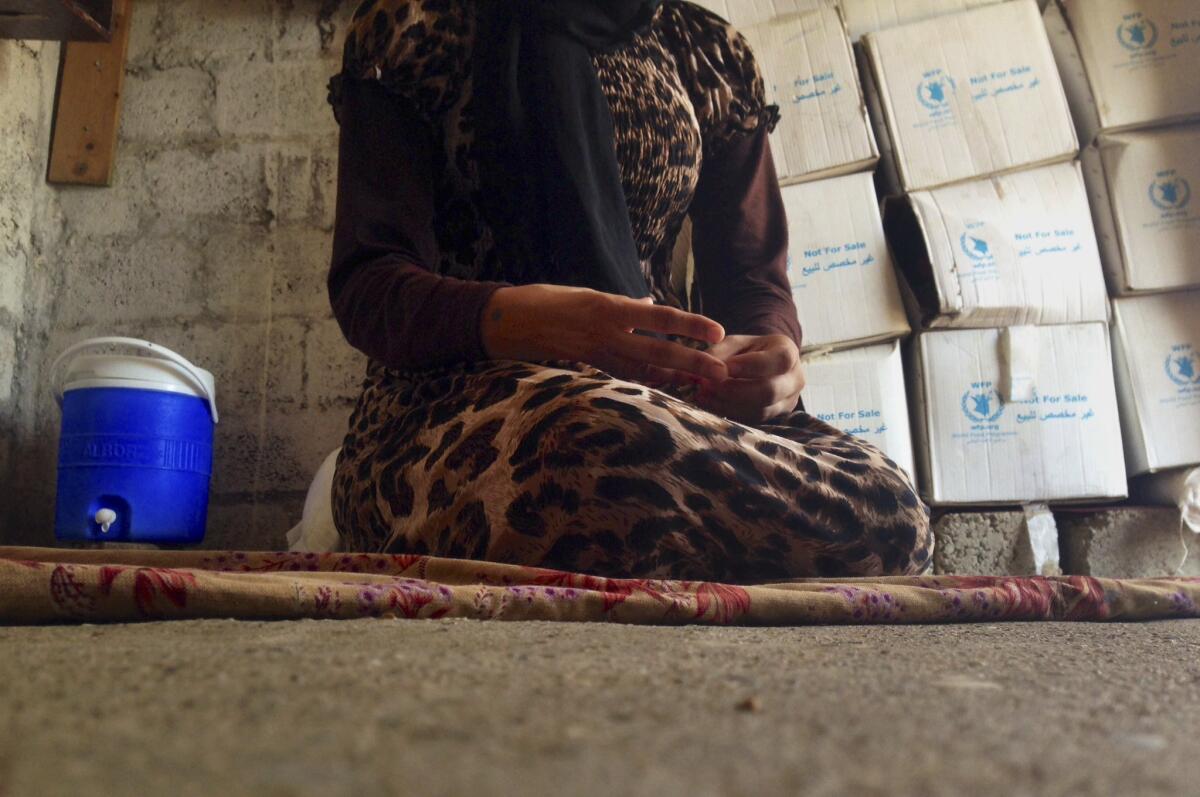Amnesty report: Yazidi women enslaved, raped by Islamic State fighters

- Share via
Reporting from Baghdad — Raped, tortured and forced to marry their Islamic State captors, some women and girls from Iraq’s Yazidi religious minority resorted to the only means of escape available: suicide.
“One day we were given clothes that looked like dance costumes and were told to bathe and wear those clothes,” recalled a 20-year-old identified only as Luna in an Amnesty International report released Tuesday, describing what a 19-year-old fellow captive named Jilan did next: “She cut her wrists and hanged herself. She was very beautiful; I think she knew she was going to be taken away by a man.”
Female captives who didn’t commit suicide, or whose attempts failed, remain deeply traumatized and in need of treatment, according to the report by the London-based watchdog group.
The grandfather of a 16-year-old who was raped in captivity but managed to escape said she remains depressed and at risk.
“She does not smile anymore and seems not to care about anything. I worry that she may try to kill herself, “ the grandfather said, adding, “I don’t let her out of my sight.”
An Amnesty International spokeswoman said more needs to be done to help women and girls who managed to flee the militants, and those left behind.
“There are limited services ... medical examinations, counseling, but they are not located where the women are sheltering,” Donatella Rovera, Amnesty International’s Crisis Response Advisor, said Tuesday. “The biggest issue, however, is for the hundreds that are still captives. There is no prospect for their ordeal to end any time soon.”
The report was based on interviews a researcher conducted this fall with four women and girls still held by Islamic State and 42 escapees among those seized during the summer when the militants took the northern Iraqi mountain town of Sinjar. Hundreds of Yazidis were killed in the attack, and tens of thousands were either stranded or fled to other parts of the country and across the border into Syria.
The Yazidis are an ancient religious minority persecuted for generations in Muslim communities as Satanists because of their beliefs, which include elements of Christianity and Judaism.
Thousands of Yazidi women, men and children may have been abducted by Islamic State, according to the report, although the exact number is unclear -- Iraq’s Human Rights Ministry says it’s hundreds. The captives, including girls as young as 10, were often forced to convert to Islam, sold or given as gifts to militants and their supporters, the report said.
Islamic State has seized large swaths of Iraq and Syria, creating a religious state or caliphate where women have few rights. The group released a brochure this month addressing, “hypothetical questions about female slaves,” according to SITE Intelligence Group, which monitors extremists.
The brochure explained that female captives can be bought, sold and gifted “since they are merely money,” that virgin captives can be raped immediately and that there’s no prohibition on sleeping with prepubescent girls.
The Yazidis’ plight spurred President Obama in August to order airstrikes against Islamic State strongholds, aiding soldiers on the ground from the Iraqi army and Kurdish peshmerga.
The campaign by a U.S.-led coalition has seen some recent success in the north, where Kurdish forces entered Sinjar this week and cleared the highway down from the mountain, aiding some trapped Yazidis. But the militants still holds areas of north, central and western Iraq and in Syria, where humanitarian groups were still negotiating to deliver medical supplies next week.
Elizabeth Hoff, the World Health Organization’s Syria representative, said the agency has been promised access to deliver 143 tons of medical supplies to the embattled city of Aleppo and the suburbs of Damascus, approaching from outside the capital.
“We have delivered to many of the areas, but what has been difficult has been to sustain regular supplies,” Hoff said Tuesday.
She said WHO will be working with the Red Crescent to deliver medical supplies, including measles and other children’s vaccines, but that the deliveries may be delayed by fighting among the Islamic State, other rebel groups and the Syrian government.
“There are many parties to the conflict, so it may be unsafe for us to deliver,” Hoff said, “It all depends if the humanitarian convoys can be secure.”
Hoff said doctors in Syria are struggling to provide trauma and primary care, particularly for those with chronic diseases such as asthma, diabetes and epilepsy. Given poor sanitation, they are also trying to prevent outbreaks of water-borne illnesses such as typhoid and Hepatitis A but face a shortage of antibiotics, she said.
She hopes next week’s delivery will open more regular supply lines.
“I am very optimistic about that from the discussions we have had with the health authorities there,” Hoff said, “The needs are great.”
Times staff writer Hennessy-Fiske reported from Baghdad and special correspondent Bulos from Amman, Jordan.
Follow @mollyhf on Twitter for news out of Iraq
More to Read
Sign up for Essential California
The most important California stories and recommendations in your inbox every morning.
You may occasionally receive promotional content from the Los Angeles Times.











